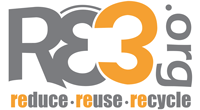 Guest Blogger – Kristen
Guest Blogger – KristenI confess. I am a recycling addict. By “recycling addict,” I mean that I want to recycle every scrap of anything I get my hands on. Before I became more educated about the process of waste management, there was a time when I might have tossed a few things into my curbside recycling bin that I knew were not accepted by my city’s curbside recycling program. When I came across a plastic take-out tray, a three-foot piece of rope I found under my deck, an oily pizza box, a Styrofoam cup, I wanted so badly to keep the items from sitting in the landfill for years and years. My logic at the time was, “I’ll just throw all this stuff in my bin for the city to deal with because that’s better than the stuff sitting in the landfill.”
Oh, how wrong I was! I know there are some of you out there that feel the same way I do. Your skin crawls when you think of all those gadgets, knick-knacks and bagatelles taking up space in a landfill. Take it from someone who is just as passionate as you are about the environment: Don’t throw materials into your recycling bin that are not accepted by your city’s recycling program!
Here’s why:
When your commingled recyclables are picked up from the curb, they are taken to a MRF (materials recovery facility) where they are sorted by machine and by hand. When something, let’s say the three-foot rope I found under my deck, that isn’t accepted by your city’s recycling program ends up at the MRF, a worker has to sift it out from the river of materials whizzing by him or her on the conveyor belt. The material then gets tossed in the trash. This step takes valuable time and energy. Now consider what happens when the plastic take-out tray that isn’t accepted by my city ends up at the MRF. If a worker overlooks it as it whizzes by, it will end up contaminating the plastic stream.
Plastics contamination occurs when a plastic with a certain viscosity (resistance to flow when in the liquid state) gets mixed with plastics of a different viscosity, resulting in a decrease in value. Putting things in your recycling bin that are not accepted by your city makes the recycling process slower, more expensive and less efficient.
Here’s what you can do:
First of all, reduce your consumption of the materials that you can’t recycle. Use multiple-use containers instead of single-use containers. Second, if you must use a material that you can’t recycle, find other uses for it before throwing it away. Perhaps, use that Styrofoam cup when washing the dog. Finally, if you find yourself itching to throw a non-accepted item in your recycling bin, DON’T. It is better for the item to be thrown in the trash than to end up at the MRF where it will decrease efficiency or contaminate the waste stream. Do your part for the planet, but do it in the most helpful way possible.
To find recycling centers near you:
- Earth 911 - What retail establishments now accept recycling?
- Ecoville – What items does my community accept and who can I contact to find out more?

1 comment:
Nice post, Kristen. You're not alone in your addiction. We recycling junkies can't even call ourselves anonymous; we're easy to spot as we fish cans and bottles out of the trash.
Post a Comment